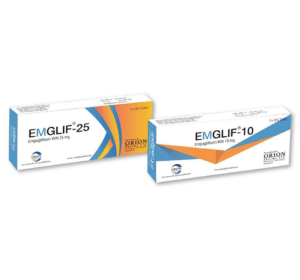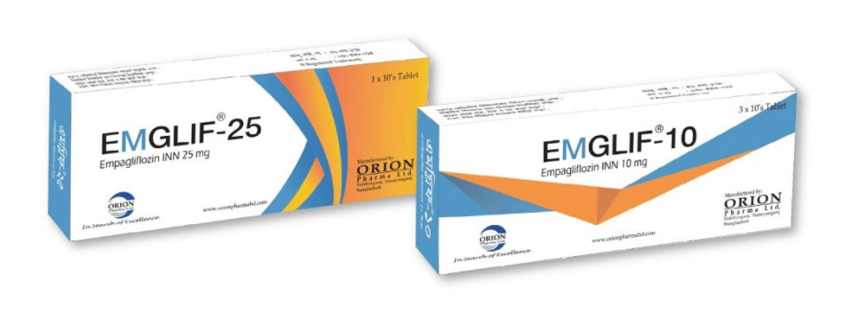Emglif

ANTIDIABETICS: Empagliflozin
Indication
Empagliflozin is indicated as an adjunct to diet and exercise to improve glycemic control in adults with type 2 diabetes mellitus.
Contraindication
History of serious hypersensitivity reaction to Empagliflozin. Severe renal impairment, end-stage renal disease or dialysis.
Dosage & Administration
The recommended dose of Empagliflozin is 10 mg once daily in the morning, taken with or without food.
In patients tolerating Empagliflozin 10 mg, the dose may be increased to 25 mg. for additional glycemic control.
Side Effect
Hypotension, impairment in renal function, hypoglycemia with concomitant use with insulin and insulin secretagogues, genital mycotic infections, urinary tract infections, increased low-density lipoprotein cholesterol (LDL-C).
Precaution
The risk of necrotizing fasciitis of the perineum/Fournier’s gangrene. Hypotension: Before initiating Empagliflozin, volume status should be assessed and correction on hypovolemia should be made in the elderly, in patients with renal impairment, in patients with low systolic blood pressure and in patients on diuretics since Empagliflozin causes intravascular volume contraction: Impairment in Renal Function: Renal function should be evaluated prior to initiating Empagliflozin and periodically thereafter since Empagliflozin increases serum creatinine and decreases eGFR.
Hypoglycemia: In patients taking insulin or an insulin secretagogue with Empagliflozin, a lower dose of insulin or the insulin secretagogue is considered to reduce the risk of hypoglycemia.
Genital mycotic infections: Monitoring and treatment should be done if indicated.
Urinary Tract Infections: Monitoring and treatment should be done as appropriate.
Increased LDL-C: Monitoring and treatment should be initiated if required.
Drug Interaction
Diuretics: Co-administration of Empagliflozin with diuretics enhanches the potential for volume depletion. Insulin or Insulin Secretagogues: Co-administration of empagliflozin with insulin or insulin secretagogues increases the risk for hypoglycemia.
Use Pregnancy Lactation
Pregnancy Category C. There are no adequate and well-controlled studies in pregnant women. Use during pregnancy only if the potential benefit justifies the potential risk to the fetus. Nursing Mothers: Discontinue Empagliflozin or discontinue nursing.
Overdosage
There were no reports of overdose during the clinical development program for removal of Empagliflozin by hemodialysis has not been studied.
Storage
Do not store above 300 C. Keep out of the reach of children.



